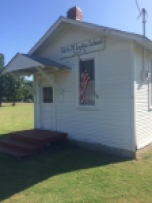 There are approximately 4 million teachers in the American public school system and many of whom are believers. The tipping point, or critical mass, for change would be 200 teachers. That’s not a huge number, but the secret is that this number has to be in complete unity. If 200 teachers all prayed in their classrooms, in one day, the results could be astounding. But teachers are trained to remain secular in their classrooms. They walk a daily tightrope to be politically correct and free of offense to any religion.
There are approximately 4 million teachers in the American public school system and many of whom are believers. The tipping point, or critical mass, for change would be 200 teachers. That’s not a huge number, but the secret is that this number has to be in complete unity. If 200 teachers all prayed in their classrooms, in one day, the results could be astounding. But teachers are trained to remain secular in their classrooms. They walk a daily tightrope to be politically correct and free of offense to any religion.
In the teaching profession, every teacher suffers his or her share of attacks as a usual routine of events. They assign too much homework and parents complain. They don’t stay after school to tutor those who were having trouble learning algebra. (Never mind that they may offer their services at noon for free tutoring every day.) They get in trouble for expecting projects and homework to be turned in on time because, after all, what has a deadline got to do with learning a subject? If the student did the work, why shouldn’t they get credit, even if it was late? The list goes on and on and every teacher who has ever tried to do his or her best has come under attack. These skirmishes erode the soul of teachers leaving them little energy to fight the big battles that change the system.
Teachers live in fear of being fired for praying over a student or even for putting up Christmas decorations in a classroom. They have no strength for losing a job over something as simple as ministering to a child. Getting a teacher to see the big battle when he or she is fighting multiple little battles every day is difficult. That is why we haven’t seen the critical mass we need to see for the change. A unified core mass is what we need and we need it now.
If Christian teachers unified to such an extent that they could define small actions that would change the system, the tipping point could happen. Malcolm Gladwell in his book The Tipping Point: How Little Things Can Make a Big Difference shares his research into what will make changes in society.53 Gladwell proposes that it is the little things that make a big difference.
Liberal educators make claims that our schools are in such a state of decline because we don’t have enough money for education or because our students are economically impoverished. They say that if we just had more money for new curriculum or if we would just make sure that everyone has money, either through welfare or through giving someone a job, that would be the best way to create better schools. But there is another factor involved that Gladwell calls “The Power of Context,” which states that it’s really the little things that matter.
For instance, the crime turnaround in New York City occurred, not because of a huge war on crime, but because of what has become known as the “Broken Windows Theory.” This theory was the brainchild of two criminologists—James Q. Wilson and George Kelling. Wilson and Kelling argued that crime is a result of disorder. If a broken window in a house in a crime-ridden part of town is not repaired, the result is that more criminal elements will be attracted to that neighborhood and the crime rate will rise substantially. There will be more houses with broken windows. Drug dealers will move into the neighborhood and there is a general feeling that the neighborhood is bad and the crime rate skyrockets. Fix the broken windows, Wilson and Kelling said, and the bad elements will abandon the neighborhood. They believed that crime was contagious.
New York City tipped when the police began to issue citations for broken windows, giving owners twenty-four hours to make repairs. Graffiti also was cleaned up within twenty-four hours of when the artful designers had completed their work of art.
What if educational administrators and teachers began to do little things like pray with students, openly display scriptures in their classrooms, or refuse to call Christmas holidays by the secular name winter holidays? The educational system can tip in the direction of being restored back to a Godly system if enough administrators and teachers would aggressively live out their Christian faith.